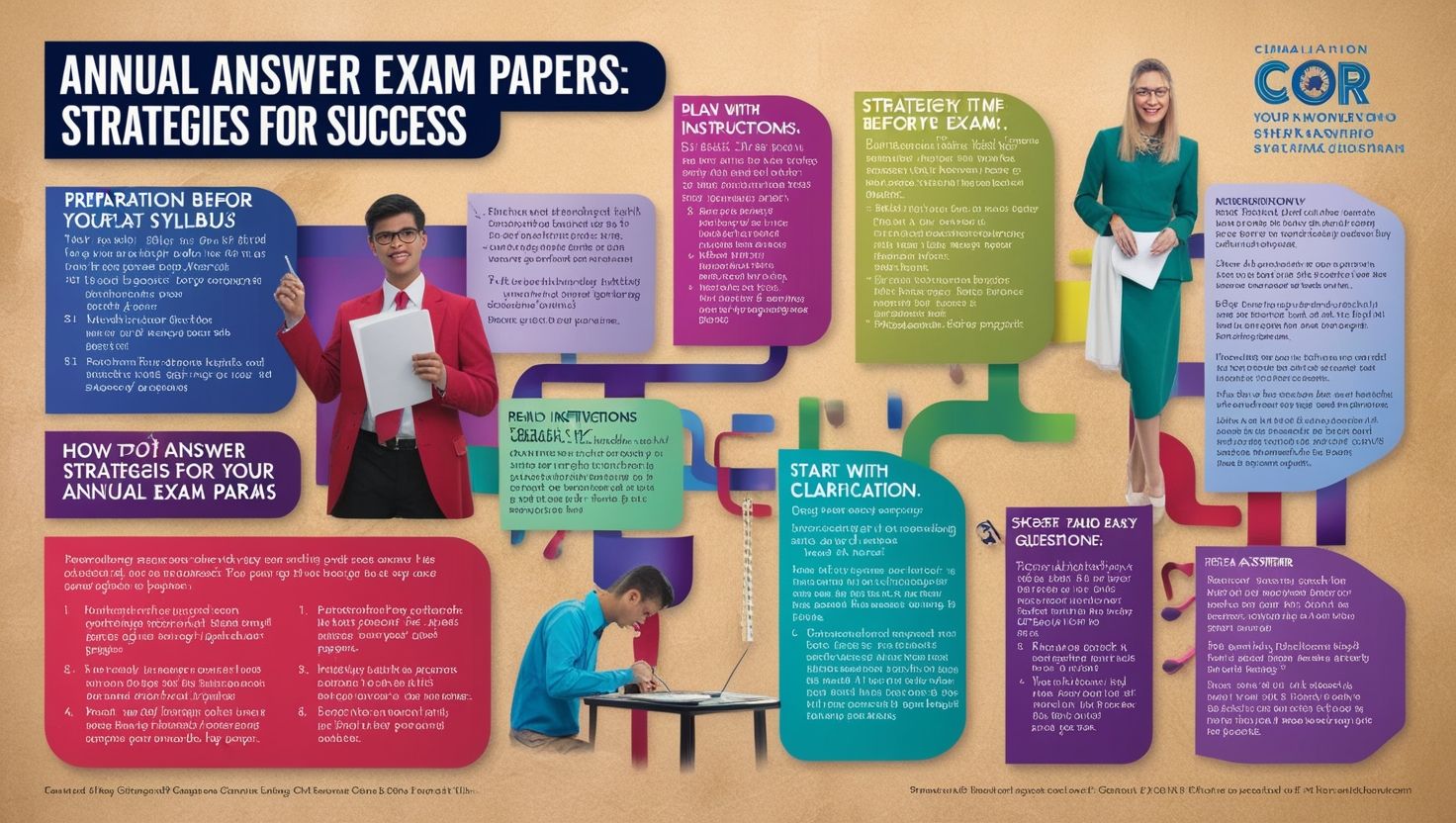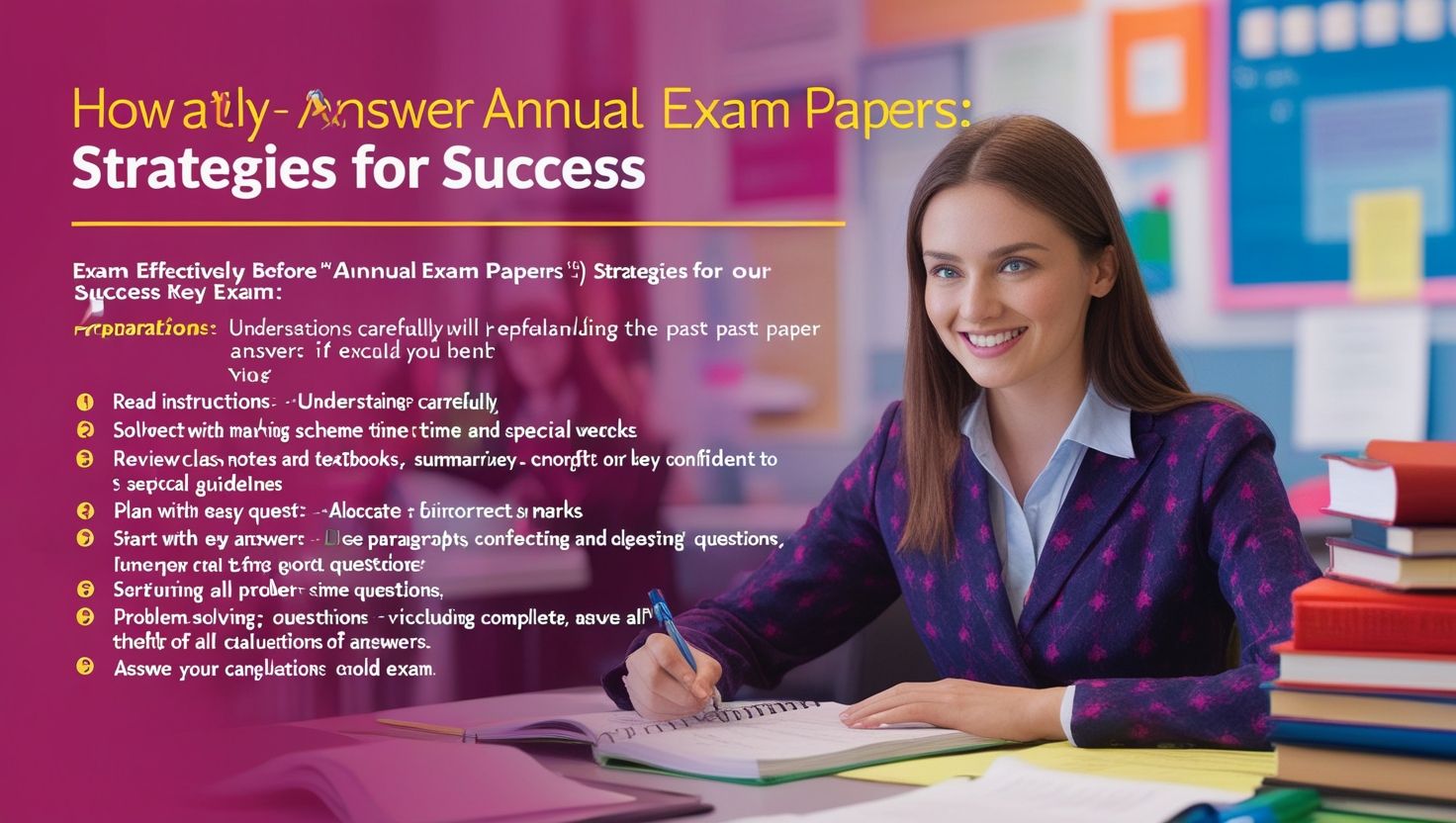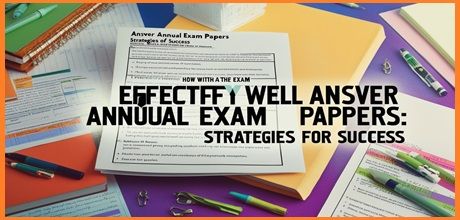Introduction
How to Effectively Answer Annual Exam Papers or Exams are a crucial aspect of academic life, serving as a measure of a student’s understanding and proficiency in a subject. Successfully attempting an annual exam paper requires strategic preparation, time management, and effective answering techniques. This article provides a comprehensive guide on how to approach and answer annual exam papers, ensuring you maximize your performance and achieve your academic goals.
Preparation Before the Exam
- Understand the Syllabus: Familiarize yourself with the entire syllabus and identify key topics that are likely to be tested. Use past papers to get an idea of recurring themes and important areas of focus.
- Create a Study Schedule: Develop a study schedule that allocates sufficient time to each subject. Include breaks and ensure you cover all topics well before the exam date.
- Practice with Past Papers: Solve past exam papers under timed conditions. This helps you understand the exam format, manage your time effectively, and identify areas where you need further revision.
- Review Class Notes and Textbooks: Regularly review your class notes and textbooks. Highlight important points and create summaries for quick revision.
- Seek Clarification: If you have any doubts or questions, seek clarification from your teachers or classmates well in advance of the exam.

Strategies During the Exam
- Read Instructions Carefully: At the start of the exam, carefully read all the instructions on the paper. Ensure you understand the marking scheme, the number of questions to be attempted, and any special guidelines.
- Plan Your Time: Allocate time for each section or question based on the marks assigned. Stick to your time plan to ensure you complete the entire paper.
- Read All Questions Thoroughly: Before starting to write, read all the questions thoroughly. Identify the ones you are most confident about and plan the order in which you will answer them.
- Start with Easy Questions: Begin with questions you find easiest. This boosts your confidence and ensures you secure marks early in the exam.
- Answer in a Structured Manner: Structure your answers clearly. Use paragraphs, bullet points, and headings where appropriate. This makes your answers easy to read and understand.
- Show Your Work: For numerical and problem-solving questions, show all your work and calculations. Even if your final answer is incorrect, partial marks can be awarded for the correct method.
- Use Diagrams and Examples: Where applicable, use diagrams, charts, and examples to illustrate your points. Visual aids can enhance the clarity and impact of your answers.
- Stay Calm and Focused: Stay calm throughout the exam. If you encounter a difficult question, move on and return to it later if time permits.

Answering Different Types of Questions
- Multiple Choice Questions (MCQs):
- Read each question carefully and all answer options before selecting the best one.
- Eliminate obviously incorrect answers to increase your chances if you need to guess.
- Beware of absolute terms like “always” or “never” in the options, as they are often incorrect.
- Short Answer Questions:
- Be concise and to the point.
- Use keywords from the question in your answer.
- Provide clear and direct responses, avoiding unnecessary elaboration.
- Essay Questions:
- Plan your essay before you start writing. Outline the introduction, body paragraphs, and conclusion.
- Stay focused on the question and avoid going off-topic.
- Use relevant examples and evidence to support your arguments.
- Problem-Solving Questions:
- Carefully read the problem and identify the key information.
- Use a systematic approach to solve the problem, showing all steps clearly.
- Check your calculations and ensure your final answer is clearly stated.
Time Management
- Keep Track of Time: Regularly check the time to ensure you are on track. Divide the total exam time by the number of questions to determine how much time to spend on each.
- Prioritize Questions: Prioritize questions based on their marks and your confidence in answering them. Tackle high-mark questions first if you are confident in those areas.
- Leave Time for Review: Aim to complete your answers with some time left for review. Use this time to check for mistakes, ensure all questions are answered, and add any additional information if necessary.
Final Review
- Check for Completeness: Ensure you have answered all required questions. Verify that you have not missed any parts of multi-part questions.
- Proofread Your Answers: Look for spelling, grammar, and punctuation errors. Clear communication is crucial for conveying your knowledge effectively.
- Ensure Clarity: Make sure your answers are clear and legible. If you have crossed out any work, ensure it is still readable in case the examiner needs to review it.
Post-Exam Reflection
- Evaluate Your Performance: After the exam, take some time to reflect on your performance. Identify areas where you did well and areas for improvement.
- Learn from Mistakes: Analyze any mistakes you made and understand why they occurred. This helps you improve your approach for future exams.
- Seek Feedback: If possible, seek feedback from your teachers on your exam performance. Use their insights to enhance your exam-taking strategies.
Conclusion
Attempting annual exam papers effectively requires thorough preparation, strategic time management, and clear, structured answering techniques. By understanding the exam format, practicing with past papers, and employing smart strategies during the exam, you can maximize your performance and achieve your academic goals. Remember to stay calm, focused, and confident, and use the opportunity to demonstrate your knowledge and skills to the best of your ability.

3hyiix
Its fantastic as your other posts : D, regards for posting. “I catnap now and then, but I think while I nap, so it’s not a waste of time.” by Martha Stewart.
I have recently started a site, the info you offer on this web site has helped me tremendously. Thank you for all of your time & work.
Great post and right to the point. I am not sure if this is truly the best place to ask but do you guys have any thoughts on where to get some professional writers? Thanks 🙂
Greetings! I’ve been reading your site for a while now and finally got the bravery to go ahead and give you a shout out from Huffman Tx! Just wanted to mention keep up the great job!
Excellent blog right here! Also your web site loads up very fast! What host are you the use of? Can I get your affiliate link for your host? I wish my web site loaded up as quickly as yours lol
This web site is really a walk-through for all of the info you wanted about this and didn’t know who to ask. Glimpse here, and you’ll definitely discover it.
Good day very cool site!! Man .. Beautiful .. Wonderful .. I will bookmark your site and take the feeds also?KI’m glad to search out a lot of useful information right here in the put up, we want develop extra strategies in this regard, thanks for sharing. . . . . .
Hello my friend! I wish to say that this article is awesome, nice written and include approximately all significant infos. I?¦d like to look more posts like this .
Hey there! Someone in my Facebook group shared this site with us so I came to give it a look. I’m definitely loving the information. I’m book-marking and will be tweeting this to my followers! Exceptional blog and outstanding design and style.
qgjhfe
7cphw2
You could certainly see your skills in the work you write. The world hopes for even more passionate writers like you who are not afraid to say how they believe. Always go after your heart.
Great insights